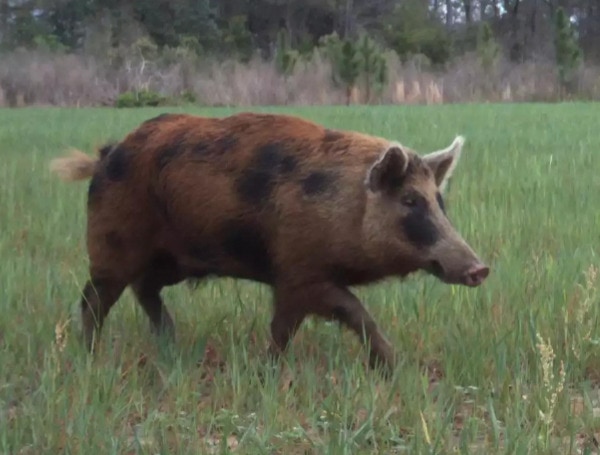Wild Hog, Source: FWC Florida is home to a thriving population of wild hogs, also known as feral swine or feral pigs. These non-native species hav
Florida is home to a thriving population of wild hogs, also known as feral swine or feral pigs. These non-native species have existed in the state for hundreds of years and can be found in all 67 Florida counties.
Captain Experiences, a platform for guided hunting excursions, has compiled a comprehensive report on the history of wild hogs across the US, their expansion, and the havoc they’ve wreaked as well as a list of the 15 states with the biggest wild hog problem.
Florida ranks third in the United States with 1,193 feral hog reports, according to Captain Experiences.
Wild hog hunting has become a popular activity, offering both recreational and management benefits.
Understanding Wild Hogs
Wild hogs, scientifically known as Sus scrofa, are free-roaming pigs that cannot be legally claimed as domestic hogs. They can reach weights of over 150 pounds and measure up to 5-6 feet in length.
These adaptable creatures occupy a variety of habitats, including oak-cabbage palm hammocks, freshwater marshes and sloughs, and pine flatwoods.
They are known to travel in small family groups, known as sounders, or alone. Wild hogs have a diverse diet, feeding on both plants and animals.
Read: Exploring The Diverse Wildlife Of Florida
Hunting Regulations and Seasons
Hunting Licenses and Permits
To hunt wild hogs in Florida, a hunting license is not required. However, a management area permit is necessary.
It is important to note that while most wildlife management areas (WMAs) do not require a quota permit for spring and summer hog hunting, some do. Before embarking on your hunting adventure, thoroughly review the WMA regulations brochure for the specific area you plan to hunt.
Hunting Methods and Equipment
Wild hogs can be hunted year-round with landowner permission. Hunters have the flexibility to use a variety of weapons, including rifles, shotguns, crossbows, bows, pistols, and air guns.
Dogs can also be used for pursuing wild hogs, provided the necessary permissions are obtained and the dogs are equipped with tracking devices. However, starting from July 1, 2022, a corrective device will be required on the collars of hunting dogs.
Bag and Size Limits
Unlike many other game species, there are no bag or size limits for wild hogs in Florida. Hunters have the freedom to harvest either sex of wild hogs without any restrictions.
This makes wild hog hunting an appealing and accessible option for hunters.
Trapping and Transporting
Trapping is a common method used to capture wild hogs. Live traps, such as box traps, cage traps, and corral traps, can be employed for this purpose. However, it is important to note that trapped animals may not be released on public lands.
They can only be released on private property with landowner permission. If you wish to transport or hold live wild hogs, you must obtain the necessary permits from the Florida Department of Agriculture and Consumer Services (FDACS).
Wild Hog Hunting on FWC Public Hunting Areas
Florida offers ample opportunities for wild hog hunting on public lands managed by the Florida Fish and Wildlife Conservation Commission (FWC). While hunting is allowed on most WMAs, there are exceptions during spring turkey season. Let’s explore the hunting regulations specific to each region:
Northwest Region
- Aucilla
- Blackwater Hutton Unit
- Portions of Blackwater
- Apalachicola Bradwell Unit
- Choctawhatchee River
- Portions of Joe Budd
North Central Region
- Andrews
- Flying Eagle
- Big Bend Hickory Mound Unit
- Big Bend Snipe Island Unit
- Big Bend Tide Swamp Unit
- Goethe
- Mallory Swamp
- Steinhatchee Springs
- Devil’s Hammock
Northeast Region
- William Beardall Tosohatchee
- Three Lakes
- Triple N Ranch
- Guana River
- Bull Creek
- Three Lakes Prairie Lakes Unit
- Fort Drum
Southwest Region
- Green Swamp
- Green Swamp West
- Babcock/Webb
- Chassahowitzka
- Myakka State Forest
South Region
- Dinner Island Ranch
- J.W. Corbett
- Dupuis
- Fisheating Creek
- Okaloacoochee Slough
- Allapattah Flats
- Hungryland
Health Advisory and Precautions
Wild hogs can carry diseases and parasites that can be transmitted to humans, pets, and livestock. It is crucial for hunters to take precautions when handling, field dressing, and butchering wild hogs.
The FWC strongly encourages hunters and trappers to follow recommended guidelines for safe handling. For detailed information on health advisory measures, please refer to the official FWC health advisory page.
Additional Information
- Trying to prevent wild hogs from entering your property can be challenging, but adequate fencing can help keep them out of small yards and gardens.
- Poisoning wild hogs is strictly prohibited in Florida.
- Private nuisance wildlife trappers can assist with trapping, removal, and disposal of wild hogs.
- The transportation and holding of live wild hogs are regulated by the Florida Department of Agriculture and Consumer Services (FDACS).
In conclusion, wild hog hunting in Florida offers a thrilling and rewarding experience for hunters. With abundant opportunities on public lands and flexible hunting regulations, enthusiasts can enjoy year-round hunting adventures. Remember to familiarize yourself with the specific regulations of each area before embarking on your hunting journey. Stay safe, follow health advisory guidelines, and cherish the memories made in the pursuit of these impressive creatures.
Android Users, Click To Download The Free Press App And Never Miss A Story. Follow Us On Facebook and Twitter. Signup for our free newsletter.
We can’t do this without your help; visit our GiveSendGo page and donate any dollar amount; every penny helps



